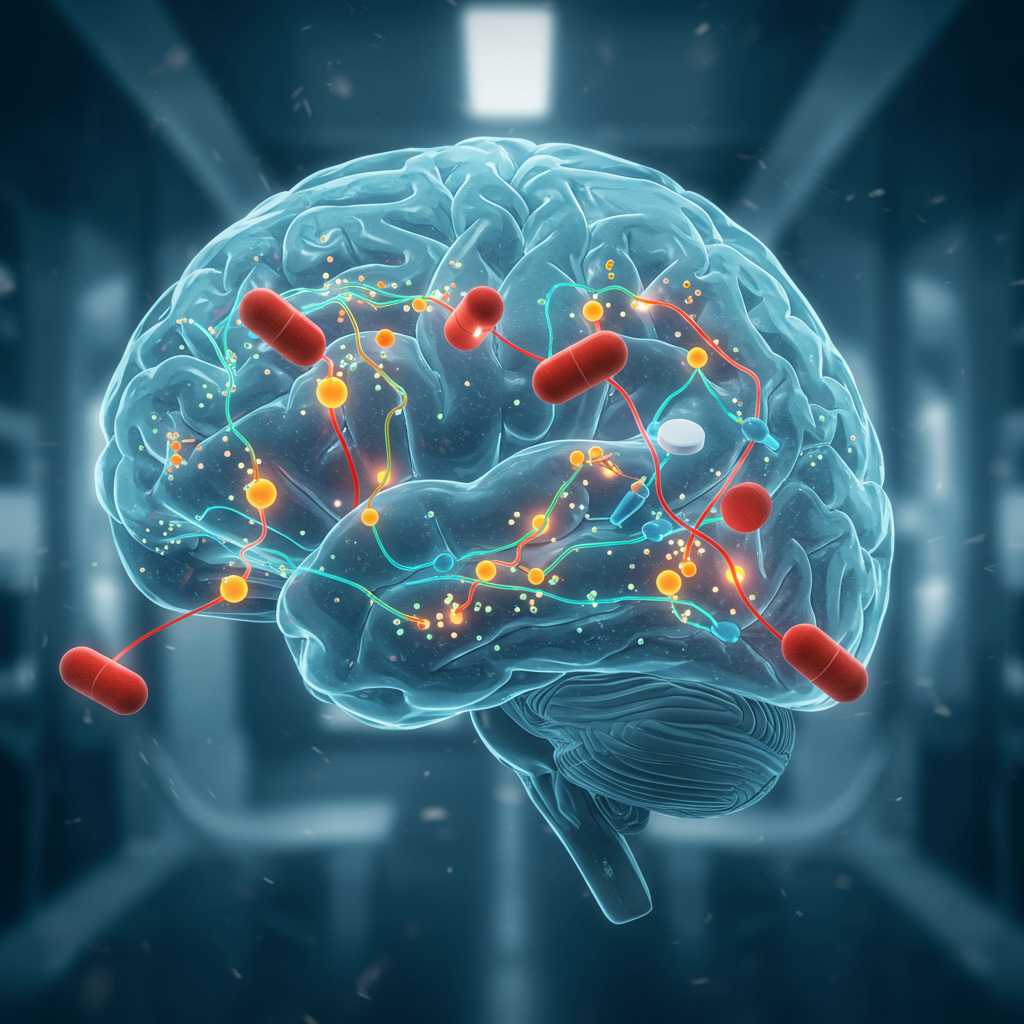For millions worldwide, antidepressants are a crucial part of managing mental health conditions like depression and anxiety. In England alone, a significant 1 in 6 adults are currently prescribed these medications. Yet, despite their widespread use, the exact mechanisms by which these drugs exert their effects on our intricate brain and body remain a subject of intense scientific inquiry and public discussion. This article cuts through the noise to explore what antidepressants genuinely do, debunking common myths and providing a comprehensive, evidence-based understanding of their impact.
Unpacking the Antidepressant Mystery: Beyond the “Chemical Imbalance” Theory
For decades, a popular explanation for how antidepressants work centered on the idea of a “chemical imbalance,” specifically a deficiency of serotonin in the brain. However, recent research has largely debunked this simplistic notion. Leading experts, like Professor Glyn Lewis of University College London, state there has never been robust evidence that selective serotonin reuptake inhibitors (SSRIs), the most commonly prescribed type of antidepressant, correct a serotonin deficit. A comprehensive 2022 review by Professor Joanna Moncrieff found no consistent link between serotonin levels and depression.
Neuroscientist Camilla Nord, author of The Balanced Brain, emphasizes that mental health is a tangible, biological phenomenon, not an abstract concept. She highlights that social and environmental stressors influence our mental well-being by inducing real, measurable biological changes in the brain and body. This perspective underscores that our mood and overall mental state are profoundly linked to physical processes, far beyond just a single neurotransmitter.
Antidepressants were often discovered by chance, and while SSRIs were designed to target serotonin, their full mode of action is still largely a “mystery.” We know they increase serotonin, a vital neurotransmitter influencing mood, sleep, appetite, sexual behavior, digestion, and blood clotting. However, the exact cascade of events that translates this initial serotonin boost into mood improvement is complex and not fully understood.
How Antidepressants Interact with Your Brain
The brain’s response to antidepressants is multifaceted. Neuroimaging studies reveal that SSRIs can decrease activity in the amygdala, often referred to as the brain’s “fear center,” and the hippocampus, a region critical for memory and emotion regulation. Over extended periods, these medications may even subtly alter the shape and size of brain areas like the anterior cingulate cortex and hippocampus. While these changes could help normalize brain activity for some individuals struggling with depression, these effects aren’t universal, and the reasons for individual variations are still unknown.
Camilla Nord’s work highlights the brain’s incredible plasticity and the profound role of expectation in shaping our biology. She notes that expectations of relief can trigger extensive brain network changes, similar to actual medications, underscoring how our mind and body are intricately connected. This also suggests that by improving neuroplasticity, antidepressants might make individuals more receptive to the benefits of psychotherapy.
Interestingly, newer treatments like ketamine, while not a traditional antidepressant, offer a glimpse into alternative pathways. Ketamine rapidly promotes the regrowth of lost synaptic connections in the brain – a fundamental biological repair that contributes to its fast-acting antidepressant effects in treatment-resistant depression. This highlights a shift towards understanding more dynamic, structural changes in brain function rather than solely focusing on neurotransmitter levels.
The Nuance of Antidepressant Effectiveness
When it comes to how well antidepressants work, the picture is far from straightforward. For individuals with mild depression, many experts suggest SSRIs are “not very effective.” For those with moderate to severe depression, combining medication with psychotherapy is often recommended, as this dual approach is considered more powerful. Experts like Professor Philip Cowen point out that antidepressants may enhance neuroplasticity, making patients more open and responsive to therapeutic interventions.
Patient experiences widely affirm the benefits. A large UK Biobank study, based on self-reported data from 20,000 individuals with major depression, found that 75% described antidepressants as helpful. However, studies relying on clinical assessments offer a more conservative view, with a 2018 review concluding that antidepressants were only marginally more effective than a placebo. Professor Cowen ultimately summarizes their utility as “better than nothing” but acknowledges they “certainly don’t work for everyone.” Their widespread prescription is often attributed to being generally well-tolerated, relatively inexpensive, and easily prescribed within national health systems.
It’s crucial to understand that while the placebo effect influences all medical treatments, robust trials show that antidepressants demonstrably work beyond comparable placebos. As Nord clarifies, it’s not simply a placebo; there’s a measurable pharmacological effect. The challenge lies in predicting who will benefit most.
Understanding Side Effects: Impacts on Your Body
Antidepressants can have a range of effects on the body, with individual drugs causing distinct side effect profiles. A significant study from King’s College London and Oxford University, analyzing data from 151 studies and over 58,000 people, highlighted notable differences:
Weight Fluctuations: Maprotiline, for instance, caused an average weight gain of nearly five pounds in just eight weeks, while agomelatine was associated with a similar weight loss. Common SSRIs like escitalopram are linked to moderate weight gain over time.
Cardiovascular Effects: Nortriptyline was found to increase heart rate by 14 beats per minute but could decrease blood pressure. Conversely, fluvoxamine decreased heart rate by eight beats per minute, and doxepin was linked to a significant rise in blood pressure.
Emotional & Sexual Changes: Many users report feelings of emotional numbness or being “flat.” Sexual difficulties, including issues with erection and orgasm, are also common and can unfortunately persist even after discontinuing the medication.
Other Risks: Professor Moncrieff points to potential risks of bleeding, hemorrhage, complications during pregnancy, osteoporosis, and bone fractures, possibly due to excess serotonin affecting other bodily systems.
Furthermore, certain antidepressants, including both tricyclic antidepressants (TCAs) and SSRIs, can impact the body’s ability to regulate temperature, making individuals more susceptible to heat-related illnesses. SSRIs, by elevating serotonin levels, can disrupt the hypothalamus’s role in controlling core body temperature. While paradoxically increasing sweating in up to 14% of users, this excessive fluid loss can lead to dehydration if not properly managed, hindering the body’s natural cooling mechanisms.
The Challenges of Antidepressant Discontinuation Syndrome
Stopping antidepressant medication can be extremely difficult for many individuals. Withdrawal symptoms, often referred to as Antidepressant Discontinuation Syndrome (ADS), can be distressing and include fatigue, pronounced mood swings, sleep disturbances, and a unique phenomenon known as “brain zaps.” While not a medical emergency, these symptoms highlight the significant physiological adjustments the body undergoes when medication is stopped or dosages are reduced. Professor Moncrieff notes that 10-20% of individuals struggle to stop taking antidepressants, a figure that can rise to 40% among those also undergoing therapy.
Understanding “Brain Zaps”
“Brain zaps” are a recognized, though often alarming, symptom primarily linked to the discontinuation of antidepressant medications. Patients describe them as brief, electrical flashes or sensations in the brain, sometimes called “brain shocks,” “brain shivers,” or “electric shocks.” These sensations are a key indicator of ADS and can occur if a dose is missed, taken late, or if the medication is stopped abruptly.
What they feel like: Descriptions vary, but common sensations include short-lived buzzing or tingling in the head, often accompanied by dizziness, “whooshing” sounds, or disorientation. Some report momentary “blacking out” or feeling their brain “blinking” or “rebooting.”
Causes: They are believed to be caused by sudden changes in brain chemistry, particularly concerning neurotransmitters like serotonin, when SSRIs and SNRIs are stopped. Medications with shorter half-lives (e.g., duloxetine, paroxetine, venlafaxine) carry a higher risk.
Prevalence: Studies show a high prevalence of ADS symptoms, ranging from 27% to 86% among those discontinuing antidepressants. A 2024 study reported that over 75% of participants experienced brain zaps. While sudden cessation is a major trigger, nearly a third experienced them even with slow tapering.
Safety and Management: While startling, brain zaps are generally considered mild, harmless, and not medically dangerous. They typically resolve within a few days or weeks. The most effective way to alleviate severe symptoms is often to restart the antidepressant at the previous dose, followed by a doctor-guided, slow, and gradual tapering schedule. Switching to a medication with a longer half-life, like fluoxetine, can also help ensure a smoother transition.
It’s vital to differentiate brain zaps from other conditions like migraine aura or seizures. If accompanied by confusion, muscle movements, or loss of awareness, immediate medical evaluation is necessary. Always consult your doctor before making any changes to your medication regimen.
Expert Perspectives and the Path Forward
The discussion around antidepressants is complex. While Professor Moncrieff expresses a strong concern that the potential harms may outweigh the benefits, suggesting they are overprescribed and offer little beyond a temporary sedative effect for some, Professor Lewis argues that unknown mechanisms are not unusual in medical treatments and shouldn’t be dismissed as a “conspiracy.”
The future of mental health solutions, as argued by Camilla Nord, lies in individualized, targeted approaches. Given that current treatments vary greatly in efficacy among individuals, the critical step is to match each person with the most suitable intervention based on their specific underlying biological causes in the brain and body.
Beyond traditional medication, brain stimulation therapies are gaining prominence. While electroconvulsive therapy (ECT) remains highly effective for severe, treatment-resistant depression, non-invasive techniques like transcranial magnetic stimulation (TMS) are proving as effective as antidepressants for some. Deep brain stimulation (DBS) is also an option for more severe cases. These approaches offer alternatives, especially for non-responders, and can target specific brain processes, paving the way for more personalized care.
Actionable Insights for Your Mental Health Journey
Navigating antidepressant treatment requires active engagement with your healthcare provider. Here are key takeaways:
Open Communication: Always have candid discussions with your doctor about potential side effects, concerns, and your experience with the medication.
Never Stop Abruptly: Discontinuing antidepressants without medical guidance can lead to significant and uncomfortable withdrawal symptoms, including brain zaps. Work with your doctor on a slow, gradual tapering plan.
Consider Combination Therapy: For moderate to severe depression, combining antidepressants with psychotherapy often yields better outcomes by making you more receptive to therapy.
Stay Hydrated: Be mindful of hydration, especially in warm weather, as some antidepressants can affect your body’s ability to regulate temperature and lead to increased sweating.
- Explore All Options: If current treatments aren’t working, discuss alternative or adjunct therapies, including newer medications or brain stimulation techniques, with your doctor.
- www.yahoo.com
- www.webmd.com
- theconversation.com
- press.princeton.edu
- www.webmd.com
Frequently Asked Questions
How do antidepressants actually affect brain chemistry beyond just serotonin?
While many antidepressants, especially SSRIs, primarily work by increasing the availability of serotonin in the brain, their effects extend beyond this single neurotransmitter. Research suggests they can influence other brain chemicals like noradrenaline and dopamine indirectly. Crucially, neuroimaging indicates they can alter brain activity in regions like the amygdala and hippocampus, potentially reducing fear responses and improving emotional regulation. Long-term use might even subtly change the physical structure and connectivity (neuroplasticity) of brain areas involved in mood, making patients more responsive to therapies.
What should I do if I experience “brain zaps” while stopping antidepressants?
If you experience “brain zaps” or any other severe symptoms of Antidepressant Discontinuation Syndrome (ADS) while stopping or reducing your medication, it is crucial to contact your doctor immediately. Do not attempt to self-medicate or stop the medication abruptly. Your doctor may advise restarting the antidepressant at a previous dose to alleviate symptoms, then help you develop a much slower, more gradual tapering schedule. In some cases, switching to an antidepressant with a longer half-life might be recommended to ease the transition.
Are antidepressants effective for everyone, or are there alternatives to consider?
Antidepressants are not universally effective, and their efficacy varies significantly among individuals. While many report them as helpful, studies show they are only marginally more effective than placebos for some, especially in mild depression. For severe cases, combining them with psychotherapy often yields the best results. Alternatives and adjuncts include psychotherapy alone, lifestyle interventions (like exercise which has a consistent positive effect), and newer treatments like ketamine for treatment-resistant depression. Brain stimulation therapies such as transcranial magnetic stimulation (TMS) and electroconvulsive therapy (ECT) are also viable options, especially for those who don’t respond to medication. Personalized treatment plans are key.
The Path Ahead
The world of antidepressants is intricate and continuously evolving. While these medications have offered a lifeline to millions, understanding their profound impact on both the brain and body requires moving beyond simplistic explanations. Ongoing research continues to unravel their complex mechanisms, refine treatment protocols, and explore personalized approaches. By fostering open dialogue with healthcare providers, embracing comprehensive care strategies, and staying informed, individuals can better navigate their mental health journey and make empowered decisions about their well-being.



